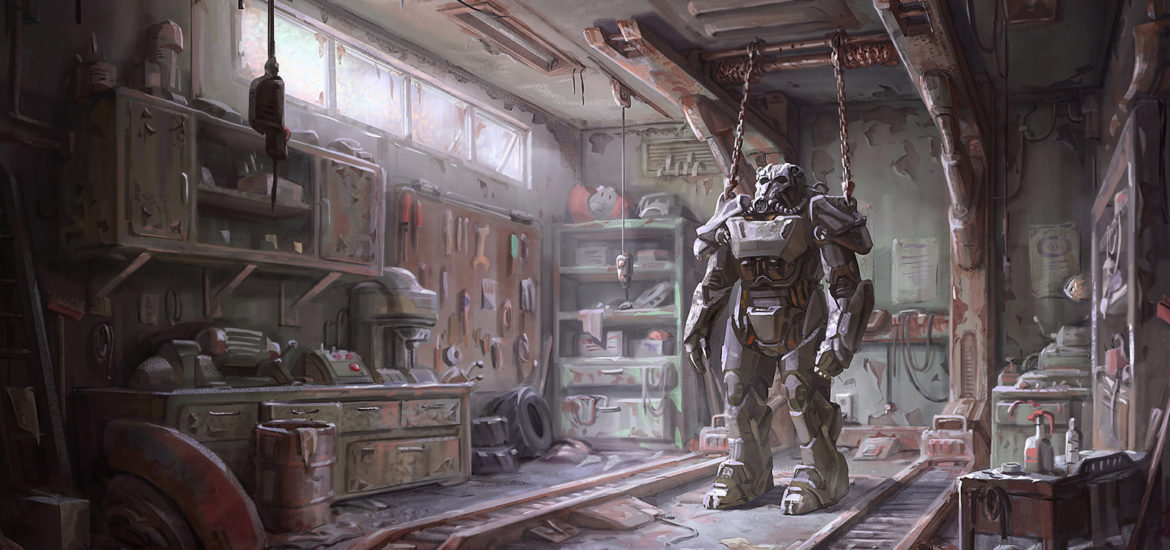Spoiler warning – this text spoils pretty much everything. Be aware before you start reading.
This text is not about the people of the Commonwealth being open-minded, quite the contrary, every faction in Bethesda’s post-apocalyptic RPG seems to be bigoted and genuinely convinced by their idea. This text is about Fallout 4 and how its diversity and narrative structure lures us into new approaches on awareness and reflection.
This is not only achieved by employing a dramatic composition that has succoured authors and screenwriters for many centuries, but also by its content that provided as a basis for discussions since the late 20th century.
Generally, the story of Fallout 4 was reviewed as defective and used as a mere requisite that is by far less important than exploring the wasteland. After seeing the ending and feeling disappointed, I wondered why a studio works seven years on such a large game, but fails to elaborate a story. Or was it done intentionally?
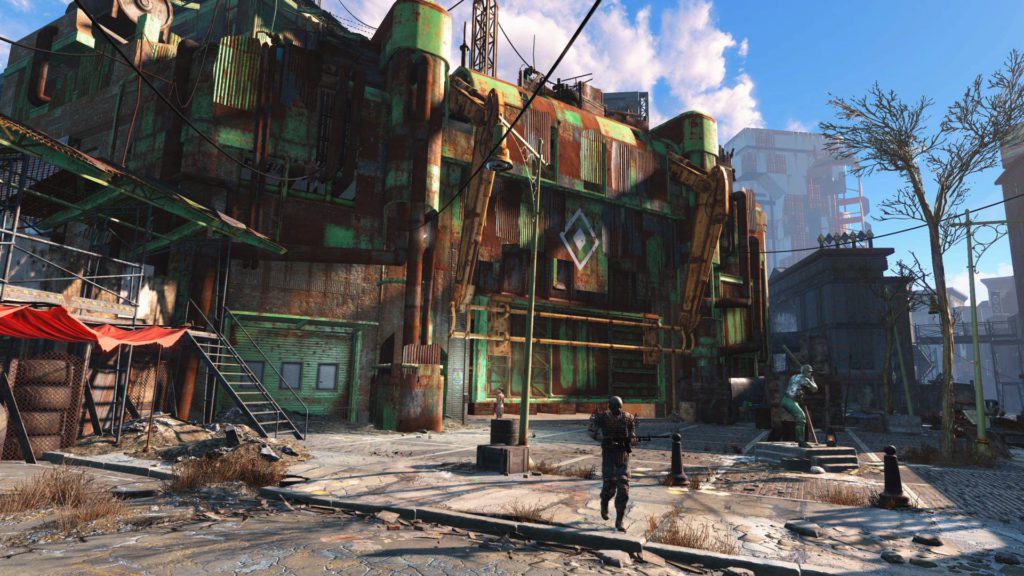
Unite players and make them talk
It offers a story that fits as a frame for a game that focuses on player agency, open world and exploration. It alludes to greater issues, but leaves it to the players to weight them. Fallout 4 demonstrates a rather familiar theme – the fight between machines and humans. However, the game does not clearly differentiate between these opponents, and after a while the issue converts into a fight between humans only (the reason for this is simple: the origin of all “new” in the world of 2287 is human, ghouls, supermutants, synths and the different groups like raiders or gunner). Another aspect featured in Fallout 4, that aids players to identify with certain characters, and thus parts of the game, is the ongoing discussion whether artificial intelligences can have a free will. The game continues this discussion and provides machines that appear human (like Nick Valentine and Paladin Danse) and asks for the player’s point of view (in order to progress and finish the game the player needs to decide for one faction and by doing so utters his stance). On the one hand, said identification (which allows players to recognise certain issues and relate to one side or another) is part of the immersion and what the player experiences while playing. On the other hand, it is the basis for Bethesda’s attempt to make people talk about the game. Not only as a marketing strategy, but as a way to encourage awareness and to reflect on decisions and witnessed happenings. This has been done since the game was released in November 2015.
Can synths have a free will?
Although the wasteland’s citizens are diverse, they are all connected to humanity in some way or another. While supermutants are mutated and extremely aggressive creatures that once were human, transformed by an infection with FEV (forced evolutionary virus), ghouls are zombie-like victims of radiation and fallout. Synths are and were produced to aid people in the first place. But as development became increasingly advanced and the synths were created as autonomous, but soulless creatures, fear spread among the people that they could be replaced by them.
These third-generation synths (henceforth referred to as synths) are the focus of a aforesaid discussion. Synths who have been forgotten or rejected are portrayed as creatures who have feelings, sense empathy and can relate to human emotions, all of which might be programmed. They express uncertainty in regards to their origin and often struggle to find their place in the wasteland’s cruel and stubborn society. In addition, the community raised the question, which is never explicitly answered in the game itself, whether synths can have a free will.
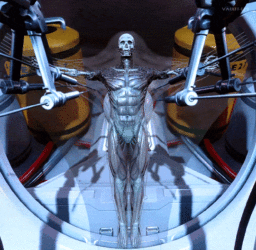
Over the course of the game the player can join one of the ambitious factions, which start as equivalent opponents with different intentions, though one prevails easily once you join them. Synths are regarded as humans by the railroad, having volition and a right of self-determination as opposed to former generations like the Mr. Handy. On the contrary, the Brotherhood of Steel reckons that humans are not allowed to interfere with nature and evolution. According to them, this abuse of power led to a war and consequently to the destruction and infestation of nature and its plants and animals, but also of an infestation of people’s minds as they tend to be unreasonably wary and frightened. The Brotherhood wants to destroy all synths and rebuild a society without artificial intelligence and robots that can “think”. Then again, the institute, which withdrew from pre-war assumptions and in 2287 furthers what they believe to be the future, attempts to control their creations, the synths, for instance by employing runners. They have no believe in the Commonwealth’s ability to maintain some kind of moral and survive for long enough to rebuild a society civilised enough to live in peace. They do not dread dangerous and questionable experiments in order to attain their goal of a better humanity with synths obeying and helping. The Commonwealth, predominantly represented by Diamond City, does not trust the institute based on a lack of communication and pure presumptions. Before deciding for anyone, the players have enough time (and quests) to listen to arguments and experience examples for every position outlined in the game. This alone is an example for the game’s attempt to show players that generalising, similar to our current society in real life, does no good and categorisation of people (or synths) is a scratch on the surface of something that usually goes much deeper than the first glimpse presages.
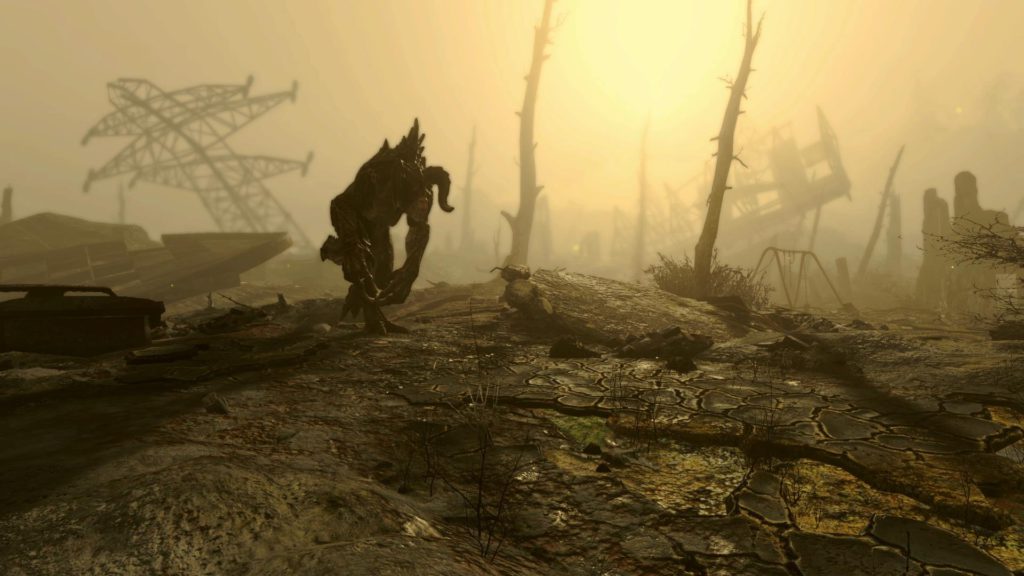
Alternative opinions emerged on whether synths have a free will and which of the game’s faction is more likely to be right. First of all, there is a user in the Steam community forum, who suggests that synths are not capable of understanding human abstract concepts like emotions and moral. According to him, these are reproduced in synths, just programmed and supposed to be executed and evoke human-like attachments. The wish to be free is caused by bugs and not intentional. Another opinion proposed on reddit claims that in a reverse world, humans might be in a similar position and synths would question their ability of having a free will. Basically, the “brain is composed of cells, of which each is a slave to impulses and nerves” and not too different from data and programmed systems in a synth. Therefore, the user debates the possibility that synths actually can have a free will and emotions. Yet another opinion posted on Youtube proposes the idea that the illusion of a free will is a programme implemented in a technical creature in order to simplify interaction or as an accidental consequence of giving them the ability to solve problems on their own.
No matter which theory you believe in or what stands out to you as the truth, the point is that people talk about something purely fictional. Yes, there are connections to our real life and the topic remains one to polarise. However, the fact that people are urged to communicate and examine the story, which seems so perfunctory, speaks for the game and its attempt on promoting diversity as well as reflection and open-mindedness.
Why Aristoteles would be proud of Bethesda
Something that stands out is that the game employs a narrative technique, which many are familiar with. Often described as a story with plot twists and a spectacular ending, the so called Aristotelian form is one that many people know. According to this form of drama, the plot consists of five acts. The exposition marks the beginning and serves as an introduction. In Fallout 4, this is the beginning, your brief moments in 2077, your horrific awakening and murder of your partner up to the point where you enter the wasteland and realise your fate. It settles the main quest, introduces you to a problem which needs to be solved. Finding your son remains to be your primary goal in Fallout 4 until you reach the second act: complication. As you find out about Kellogg and where your son is supposed to be, things turn out to be more complicated than you had hoped. Instead of walking into a house and finding Shaun, you now need to find a way to enter the institute, a place people have searched for decades. It gets a lot more complicated when you discover that there is no real entrance and teleportation is the key. Eventually you gain access and reach the game’s climax, the third act: You find your son being an old man and the director of the institute, which people tried to persuade you is the enemy. After a while, the fourth act, reversal, is initiated. You are requested to choose a side and decide to support one faction in their battle against the others. You either stay with your son and betray those whom you have probably followed up to this point or you beguile him in order to help one of the others to destroy the institute. Whatever side you decide for, the fifth act ends in a catastrophe for some (likely illustrated by a giant explosion) and a denouement for others.

Additional narrative techniques used in closed drama (yet another name for the structure previously explained) are a coherent line of actions – obviously there is no ellipsis, summary or stretch and you follow your character from the beginning to the ending with a consistent story time. A popular way to implement the player (or viewer back in ancient Greece) is to involve the recipient’s feelings – an element which games as a medium can almost exclusively use. They stress the immersive experience, especially when the player is forced to decide something which is elementary, like the rise or demise of a faction (the last achievement is called “Decide the fate of the Commonwealth” for a reason). This is so evidently used in games, and Fallout 4 is no exception, that people tend to forget about it as a narrative technique. Besides, a catharsis – killing the own son as a purge to start from scratch in a new world – and poetic justice – instead of reconciliation, the game rewards virtue and punishes the opposite – can be found in the game, too. Is killing synths heroic or a sin? Is setting them free a notable achievement or shall it be punished? That depends on the player and his choice.
When Freedom calls – carving the way for games and their potential
The question that remains to be answered is: Why all that? The answer is: to highlight the importance of scrutinising and reflecting on what happened. Games are not a passive medium, but one that invites the players to participate and not only explore the world shown to them. It wants players to think about certain issues and to handle situations as well as the consequences and the impact of their decisions. These situations do not necessarily occur in real life; it is all about the alternative world, that challenges you on a new level.
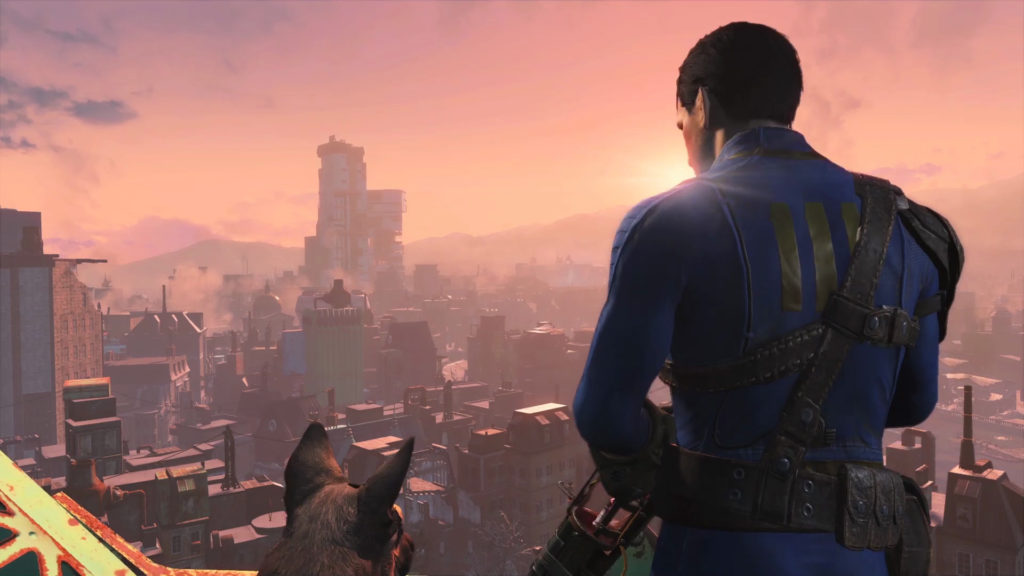
Fallout 4 shows humanity’s struggle to be gratified with nature and being dissatisfied by not having control over the events affecting them, eventually leading to the nuclear annihilation and an environment out of control, destroyed by haughtiness and overestimation of one’s abilities. Furthermore it refers to a common discussion and triggers a dialogue among players. This is done by the content, as explained earlier, but also through its narrative structure. Many claim to have foreseen the plot twist and ending, but this structure is so commonly used that actually few people have missed it. Even if many might not have recognised it explicitly, they are aware of it. Bethesda used this circumstance and requested players to dispute its story.
By limiting the story and only relinquishing as little as possible, Bethesda allows for the players to opt for communication by virtue of the internet and social media. Also, the player’s imagination contributes to widespread discussions about fictional events and species. Both, the dialogue in addition to the player’s fantasy, contribute to Fallout 4’s story which, subsequently though unwittingly, leads to a reflection of the game’s narrative and one’s decisions. Therefore, without the player knowing, Fallout 4 encourages tolerance, yet more importantly, it highlights the effect of awareness, communication and reflection of reception and offers a new approach on dealing with unknown issues. All of this just happened, launched by the game’s seemingly plain and dilettante story. It just made us all talk and as Emil Pagliarulo explained at the E3 2015: There is always “a glimpse of hope” – not only concerning the sole survivor, but us as recipients.
